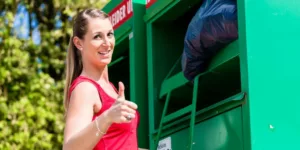Recycling is one of the easiest ways to conserve resources. We need natural resources like food, shelter, and water because they are the principal source of our daily needs. Nearly all natural resources are limited, but that isn’t a secret. Media warns us of the scarcity of natural resources and the implications for sustainable development almost every day. There are billions of people on the planet and the demand keeps on increasing as far as natural resources are concerned. Resources are finishing off very fast. It’s a good thing we have recycling. Through recycling, used materials are transformed into new, useful products without much difficulty.
Germany is believed to have the best recycling rate in the world. We beg to differ. Norway is a pioneer in transforming waste into energy. Not a lot of people are aware of the fact that Norway was the first country to have ever introduced a law on recycling mentioning that at least half of all beverage and packaging should be recycled. The Danish waste policy carries on the effort to reduce the impact on the environment, with a specific focus on resource use. Citizens, as well as politicians, understand that it’s possible to get maximum value out of resources and that it’s to the advantage of the environment and economy. In what follows, we’re going to take a close look at Denmark’s revolutionary system for recycling.
The Statutory Order on Waste
An official recycling system was established in Denmark in 1978. This represented the first step towards becoming one of the main recyclers in Europe. The following step was taken in 1989 when the Statutory Order on Waste was implemented. The aim of this regulation is to manage the production and disposal of sweepings. What else? A strategic objective for Denmark is to promote recycling and sustainable economic growth. To attain this objective, focus is placed on cooperation. Denmark will work closely with everyone who are willing to make a contribution to ensuring that the needed changes will be implemented.
A shift from landfilling to incineration
Landfilling refers to the process by which solid waste is placed on the landfills. Dumping waste materials or garbage in a particular area isn’t a good practice. Landfilling doesn’t bury the chemical composition of the by-products and they inevitably end up in the air that we breathe. In addition to air pollution, mention can be made of objectionable smells. Even though Denmark has one of the lowest landfilling rates in Europe, the country doesn’t get too comfortable. Concerns with reference to climate change have increased the efforts of the nation for change in cities, as well as in companies.
Every city in Denmark disposes of an incinerator, which is publicly owned. Incineration is largely viewed as a practical solution due to the fact that it avoids the production of virgin materials and fewer emissions of carbon dioxide. Burning waste is great for heating and powering Danish homes. As a matter of fact, approximately 98% of Copenhagen city heating is supplied by waste heat. Will Denmark ever leave the incineration age? It’s believed that the country will close most of its incineration plants by 2050. In other words, it will slowly move away from incineration. This will have a high impact on the way that businesses do things. Undoubtedly, we’re talking about the recycling industry. There are numerous ingenious global solutions providers for waste handling and recycling, such as Miltek in Denmark, that want to make waste management easy for everyone.
Disposal of commercial or household waste
In the old days, local Danish municipalities and authorities had the liberty to take action and determine their own forms of government. In plain English, they had the right to take initiatives within the area of waste management and separate accumulation for recycling. Owing to the changes in waste regulation by 1 January 2010 municipalities and local authorities no longer exercise complete power when it comes to assuring that sufficient recycling capacity is accessible at public and private level. They weren’t the main competent authorities any more.
The Statutory Order on Waste was revised and extended throughout the years, the last modification being realized in 2012. As stated in the Danish law, local authorities are able to make decisions regarding the collection system. At present, they are in charge of household and commercial waste collection for incineration and landfilling. Denmark plans to extend the recycling system beginning with 2020. The government wants to significantly reduce wastage and prevent natural resources from becoming waste in households and businesses. It’s interesting to note that there is a separate collection for municipal waste. The Danish was of collecting household waste doesn’t exist. Instead, we can talk about some demands like the introduction of:
- Collection schemes for paper and cardboard
- Collection schemes for recyclable glass packaging waste
- Collection schemes for recyclable metal and plastic packaging waste
Danish companies are making tremendous efforts to reduce food loss and waste. To be more precise, they are actively working to reduce individual levels. Fruit and vegetables are collected from local shopping centers and they are sold. Companies in the food industry reduce uncontrolled use during cooking. When this isn’t possible, enterprises try to reduce the amount of waste that is being sent to the landfills. The waste is compacted with the helps a baler and then sent to a waste and recycling facility. Businesses are leading a revolution. If only more companies would strive to reduce and recycle waste.
Are Danes better at recycling than the rest of the world?
Danes are getting better at processing and reusing materials. Waste materials coming from public and private sectors haven’t gotten bigger. People, for their part, don’t seer recycling as inconvenient. Actually, they are happy to do it. Many individuals start home recycling systems so that they can dispose of the garbage with good conscience. Businesses invest heavily in balers and compactors that allow them to sort and reduce waste. If in the past the Danes weren’t so good when it came to recycling, now, it’s a completely different story. Denmark recycles more waste as compared to other European countries. The nation wants to be without waste and they are making efforts in this sense. There is no way of knowing what the future will be like. One thing is for sure: there won’t be piles of rubbish.








